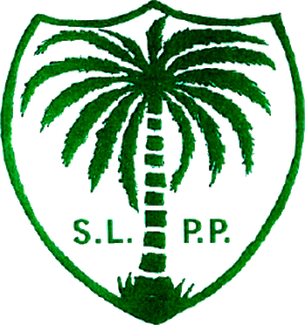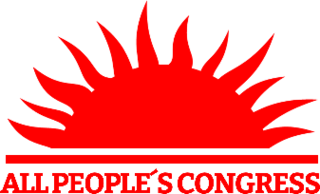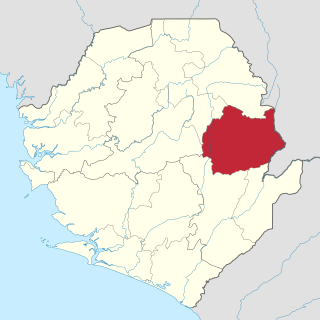
The Sierra Leone People's Party (SLPP) is one of the two major political parties in Sierra Leone, along with its main political rival the All People's Congress (APC). It has been the ruling party in Sierra Leone since 4 April 2018. The SLPP dominated Sierra Leone's politics from its foundation in 1951 to 1967, when it lost the 1967 parliamentary election to the APC, led by Siaka Stevens. Originally a centre-right, conservative party, it identifies since 2012 as a centre-left social democratic party, with a centrist tendency.

Siaka Probyn Stevens was the leader of Sierra Leone from 1967 to 1985, serving as Prime Minister from 1967 to 1971 and as President from 1971 to 1985. Stevens' leadership was often characterized by patrimonial rule and self-indulgence, consolidating power by means of corruption and exploitation.

The All People's Congress (APC) is one of the two major political parties in Sierra Leone, the other being its main political rival the Sierra Leone People's Party (SLPP). The APC has been the main opposition party in Sierra Leone since 4 April 2018 when Julius Maada Bio of the SLPP won the 2018 presidential elections, though it maintains a majority in parliament.

Julius Maada Wonie Bio is a Sierra Leonean politician and 5th and current president of Sierra Leone since 4 April 2018. He is a retired brigadier in the Sierra Leone Army and was the military head of state of Sierra Leone from 16 January 1996 to 29 March 1996, at only 32 years old in a military junta government known as the National Provisional Ruling Council (NPRC). Bio is the first democratically elected president of Sierra Leone born after Sierra Leone's independence from British colonial rule in 1961. As president Bio has implemented free primary and secondary school education in government schools throughout Sierra Leone and has repealed the death penalty in the country after it was passed Parliament.
The Ndorgborwusui War or Bush Devil War, was an episode of political violence that occurred in 1982 between supporters of the All People's Congress (APC) and the Sierra Leone People's Party (SLPP) in Sierra Leone. The violence was centered in Pujehun District, especially in the Soro-Gbema chiefdom. It was triggered by the ruling APC party's alleged electoral manipulation and the intervention of a special squad of customs police against supporters of the SLPP candidate. A local armed uprising erupted after a senior APC politician rigged elections in the district and threatened to punish the people of Soro-Gbema, who cried foul at the electoral fraud-may.
The People's Movement for Democratic Change (PMDC) is a liberal party in Sierra Leone. It is a breakaway faction of the Sierra Leone People's Party (SLPP). It was officially registered on 19 January 2006. The party is led by Charles Margai, the son of Sierra Leone's second prime minister Sir Albert Margai and the nephew of Sir Milton Margai. The PMDC is based in the country's second largest city of Bo.

Charles Francis Kondo Margai is a Sierra Leonean politician and constitutional lawyer who served as Attorney General and Minister of Justice of Sierra Leone in 2018.

Ernest Bai Koroma is a Sierra Leonean politician who served as the fourth President of Sierra Leone from 17 September 2007 to 4 April 2018.

Kono District is a district in the Eastern Province of Sierra Leone. Its capital and largest city is Koidu Town. Motema is the second most populous city in the district. The other major towns in the district include Yengema, Tombodu, Jaiama Nimikor and Sewafe. The district is the largest diamond producer in Sierra Leone. The population of Kono District is 620,703. Kono District borders Kenema District to the southwest, The Republic of Guinea to the east, Koinadugu District to the northeast and Kailahun District to the southeast. Kono District is divided into fourteen chiefdoms.

General elections were held in Sierra Leone on 11 August 2007. Seven candidates competed in the first round of the presidential election; no candidate received the necessary 55% of the vote to win in the first round, and a second round was held between the top two candidates, Ernest Bai Koroma of the All People's Congress (APC) and Solomon Berewa of the Sierra Leone People's Party (SLPP), on 8 September. According to official results, Koroma won the election with 54.6% of the vote.
Sierra Leone Progressive Independence Movement was a political party in Sierra Leone, led by Paramount Chief from Kono, Tamba Sungu Mbriwa. The party was founded in 1958, through the merger of the Kono Progressive Movement and the Sierra Leone Independence Movement. The objective of the party was, according to its founding declaration, to "prosecute more vigorously a political campaign for national unity and independence."
Democratic People's Congress was a political party in Sierra Leone. It was founded in July 1965, by remaining elements of the Sierra Leone Progressive Independence Movement in Kono. DPC consisted of a generation of younger former SLPIM cadres. By the end of July DPC declared that it would work in alliance with the All People's Congress.

General elections were held in Sierra Leone Colony and Protectorate in May 1957. A total of 39 seats were up for election, whilst another 12 paramount chiefs were indirectly elected.

General elections were held in Sierra Leone Colony and Protectorate in November 1951.

General elections were held in Sierra Leone on 17 March 1967. They were won by the opposition All People's Congress, marking the first time that a ruling party had lost an election in sub-Saharan Africa. However, the APC was overthrown in a military coup hours after taking power. The party was later restored to office after a counter-coup the following year and established a long-standing dictatorship.

General elections were held in Sierra Leone on 17 November 2012. The result was a sweeping victory for the ruling All People's Congress. Its leader, incumbent president Ernest Bai Koroma, won 58.7% of the vote, enough to win a second term without the need for a runoff. The APC also won 67 of the 112 elected seats in Parliament. To date, it is the APC's best showing at an election since the restoration of multiparty politics in 1991.

The Dominion of Sierra Leone was an independent sovereign state with Queen Elizabeth II as its head of state between independence on 27 April 1961 and becoming the Republic of Sierra Leone on 19 April 1971.

General elections were held in Sierra Leone on 7 March 2018 to elect the President, Parliament and local councils. Incumbent President Ernest Bai Koroma did not run for another term, as he was constitutionally ineligible, having served the maximum ten years in office.

General elections were held in Sierra Leone on 24 June 2023 to elect the president and members of Parliament. Incumbent president Julius Maada Bio was re-elected with 56% of the vote and the Sierra Leone People's Party won 81 seats in Parliament compared to the main opposition party, the All People's Congress, which won 54 seats. The result was contested by the All People's Congress, which demanded a rerun, citing "glaring irregularities". European election observers stated that there were "statistical inconsistencies" in the presidential results published, with the European Union Election Observation Mission saying that the electoral commission should "publish disaggregated results data per polling station to allow for public scrutiny of the results." Unless that happened, it said that transparency was compromised. The Carter Center echoed these sentiments, as did the United States, Britain, Ireland, Germany, France and the European Union.













